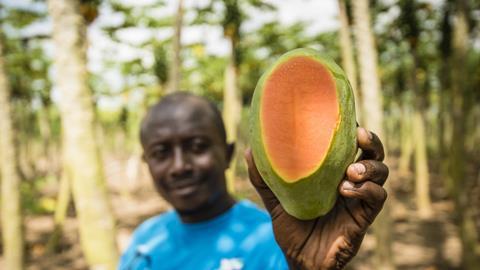Adding value at source, employing local people, and transforming communities has been central to the supplier’s approach since sending its first fruit to UK in 1998
Prepared fruit specialist Blue Skies has notched up 25 years of supply, marking a quarter century since the socially minded company sent its first consignment of fruit to Sainsbury’s.
Speaking to FPJ, company chairman and founder Anthony Pile said the journey so far had been “huge fun” and vowed to preserve the supplier’s culture of “people, profit and quality”.
On 26 February 1998 the business airfreighted around 50kg of pineapple from Ghana to Sainsbury’s – a shipment that was transported by Pile to Accra airport in an RKN container loaded onto the back of a pick-up truck.
Fast forward 25 years and the company is now airfreighting pots of fresh-cut fruit to a global customer base – including supermarkets in the UK and across Europe – most notably in France, the Netherlands and Belgium.
Blue Skies employs over 5,000 people in 10 factories spanning Ghana, Egypt, South Africa, Brazil, Benin and the UK, and is proud to have more women than men in senior management positions.
In Ghana alone, Blue Skies’ biggest production country, the company employs 2,500-3,000 local people (depending on the time of year), paying up to three times the national minimum wage. As such, it has played a pivotal role in transforming the economic fortunes of Nsawam, the town where its three Ghanaian factories are based.
Adding value at source
The Blue Skies ethos is to add value at source, which means that, wherever possible, fruit is cut, prepared, and packed in the same community that it is grown.
This allows Blue Skies to return a higher margin to the communities that produce the fruit, and to harvest the produce at its optimal maturity, helping to ensure the best possible nutrition and flavour.
“We needed always to have a raison d’être apart from just making a profit,” Pile told FPJ. “It was important to us to meet what consumers wanted in Europe, which was adding value at source and fresh from harvest.
“Adding value at source is hugely important to the countries we operate in because instead of taking their raw materials – the diamonds, the gold, the oil – and then processing them elsewhere, we do everything in situ. And that has gone down very well.
“On top of that, we always use indigenous people. For example, we have a Ghanaian woman as the general manager of our large operation there. Ditto in Brazil.
“I think that has been our secret, particularly in Africa, where there was inevitably suspicion about why that white man has turned up to set up a fruit business. ‘Is he just after us and our money?’ But we’ve said: ‘No, this is yours – you run it.’”
Changing lives
Blue Skies produces and prepares a range of fruits from its bases in Africa, Brazil and the UK – most notably pineapple, mango, pomegranate, melon, passion fruit and coconut.
In addition to fresh-cut fruit, the company produces different flavours of coconut-based dairy-free ice cream (for sale at Waitrose and in West Africa) and various fruit juices (for sale in Egypt, Ghana and South Africa).
The company celebrated its 25th anniversary at a special ceremony in Nsawam, Ghana to coincide with the launch of its collaborative project to develop strategies to reduce plastic pollution in food supply chains in Africa.
The project is being organised through the Fresh Produce Impact Hub (FRESHPPACT), which brings together retailers, food manufacturers and agribusinesses involved in the supply of fresh produce sourced from Ghana, Kenya, Senegal, Tanzania, and Zambia.
Reflecting on the company’s journey so far, Anthony Pile said: “Our incredible achievement is that we’ve done our bit to stop thousands of people feeling compelled to risk their lives by trying to migrate to Europe in search of a better life.
“By paying our workers way above the minimum wage, it means they’ve got enough income to put food on the table or provide an education to their children, and normally they can do both.
“An awful lot of kids who have joined us will go on to send their children to university, and they won’t need to risk their lives crossing the Sahara, the Mediterranean, and eventually the Channel. I feel hugely pleased about that.”
Passing the baton
Pile added that he had “no intention” of selling the business, and that his son Hugh, who took over from him as CEO in 2020, was the perfect man for the job.
“He’s exactly the guy to take us forward and he will do great things,” said Pile. “Having got the thing up and running, now is the time to have a smart, well-educated, balanced, and sensible person in charge, who listens to others and then makes the right move. Hugh’s got all of that.”
He added: “I think it’s going to be vital to have a continuation of the family business rather than a private equity arrangement that ends in five years’ time. I shall go to my grave and be able to pass it on.”




